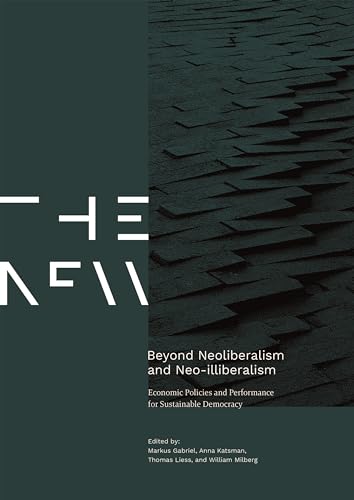
Beyond Neoliberalism and Neo-illiberalism: Economic Policies and Performance for Sustainable Democracy
Markus Gabriel, Anna Katsman, Thomas Liess, William Milberg
Publisher
transcript publishing
Publication Date
10/29/2024
ISBN
9783837674873
Pages
232
Categories
Questions & Answers
Neoliberalism and neo-illiberalism significantly impact economic policies and democratic stability. Neoliberalism, characterized by deregulation, free markets, and reduced government intervention, often leads to economic growth but exacerbates inequality and social instability. This can undermine democracy as marginalized groups feel alienated from the political process.
Neo-illiberalism, a response to the perceived failures of neoliberalism, involves more state intervention, often in the form of populism and authoritarianism. It can lead to short-term economic gains but often at the cost of democratic norms and social cohesion. Both ideologies can undermine democratic stability by promoting economic policies that prioritize the interests of a few over the broader population, leading to social unrest and political polarization. The challenge lies in finding a balance between economic efficiency and social justice to ensure sustainable democracy.
The key economic policies and performance indicators of neo-illiberal regimes include:
-
Protectionism and Anti-Immigration Policies: These regimes often implement protectionist trade policies and restrict immigration, aiming to bolster domestic industries and national identity.
-
Labor Suppression: Neo-illiberal governments typically weaken labor rights, deregulate labor markets, and suppress wages, leading to increased labor flexibility and reduced worker protections.
-
Support for Oligarchic Elites: These regimes often favor the interests of wealthy individuals and corporations, leading to economic concentration and reduced competition.
-
Targeted Social Programs: While providing some social benefits, these programs are often designed to support population growth and electoral support, often through clientelism and ethno-nationalism.
Performance indicators include:
-
Economic Growth: Neo-illiberal regimes may experience short-term economic growth, but often at the expense of long-term sustainability and equity.
-
Inequality: These regimes tend to exacerbate income and wealth inequality, as policies favor the wealthy and powerful.
-
Political Backsliding: The erosion of democratic institutions and the rise of authoritarianism are common indicators of neo-illiberalism.
-
Social Cohesion: Neo-illiberal regimes often lead to increased social tensions and decreased social cohesion.
Economic precarity and inequality contribute to the rise of neo-illiberalism through several mechanisms. Firstly, economic insecurity, often exacerbated by neoliberal policies, leads to social discontent and a loss of trust in democratic institutions. This fosters support for strongman leaders who promise stability and economic prosperity, often at the expense of democratic norms.
Secondly, inequality creates a divide between the elite and the masses, with the former benefiting from globalization and deregulation. This divide can lead to resentment among the less affluent, who may support illiberal policies that promise to protect their interests, even if these policies undermine democracy.
Moreover, in the context of economic precarity, individuals may become more susceptible to populism and authoritarianism, as they seek simple solutions to complex problems. The platform economy, with its inherent precarity, can exacerbate this trend by reinforcing individualism and anti-establishment sentiments.
Lastly, the lack of economic opportunities and the perception of a shrinking middle class can drive support for nativist and xenophobic policies, as people seek to protect their economic interests through restrictive immigration and trade policies. These factors collectively create a fertile ground for the rise of neo-illiberalism.
The book "Beyond Neoliberalism and Neo-illiberalism" suggests several alternatives to both neoliberalism and neo-illiberalism for sustainable democracy. These include:
-
Inclusive Economic Rights Framework: This framework focuses on providing resources to all people, ensuring economic security and self-determination, and prioritizing human capabilities, morality, sustainability, and civic engagement.
-
Progressive Capitalism: This approach aims to promote freedom and support democracy by addressing the failures of neoliberalism, such as inequality and slower growth, and focusing on inclusive societies and full employment.
-
Reforming Economic Policy: The book emphasizes the need for economic policies that stabilize the crisis-prone capitalist economy, support equitable distribution of income, and ensure macroeconomic stability.
-
Reforming International Economic Institutions: The project suggests reconstituting international economic institutions to better serve the needs of the global economy and support progressive, equity-oriented goals.
-
Labor Market Policies: The book advocates for policies that ensure full employment and the creation of stable, good jobs, which can contribute to economic growth and support democratic conditions.
These alternatives aim to create a more equitable, sustainable, and democratic economic system that can support the well-being of all citizens.
The humanities and social sciences can address neo-illiberalism challenges by offering nuanced perspectives on human behavior and societal dynamics. They can:
-
Examine Root Causes: By analyzing the historical, cultural, and social contexts, these disciplines can identify the underlying causes of neo-illiberal trends, such as economic insecurity, social fragmentation, and political disillusionment.
-
Promote Inclusive Dialogue: They can facilitate conversations that bridge diverse viewpoints, fostering understanding and empathy, which are crucial for building inclusive societies.
-
Develop Ethical Frameworks: The humanities can contribute moral and ethical perspectives to economic and political decisions, advocating for policies that prioritize social well-being over profit.
-
Enhance Policy Analysis: Social sciences can provide rigorous analysis of policy impacts, helping to design more effective and equitable solutions.
-
Educate and Raise Awareness: By educating the public about the complexities of neo-illiberalism, these disciplines can empower individuals to participate in informed democratic processes.